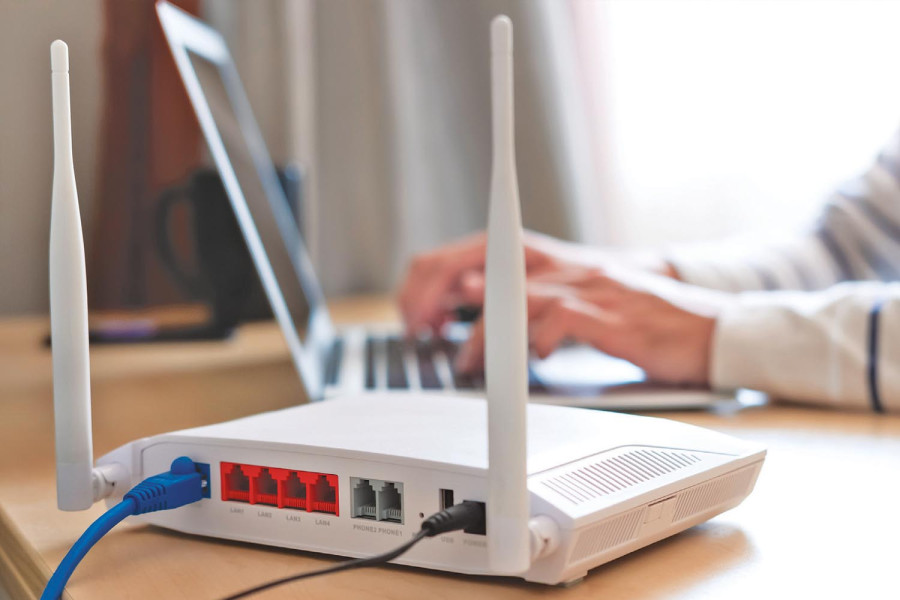Money
New policy bans refurbished routers
A customer can continue using the same router when switching to another service provider, the telecom regulator says.
Krishana Prasain
The Nepal Telecommunications Authority has implemented a new standardisation policy for wireless routers that bars service providers from repairing the devices and reselling them.
The telecom regulator has also made routers usable with all networks, which means if a customer switches to another internet service provider, they can continue using the same device and don't have to get a new one.
The router connects a computer to the internet, and service providers currently have dedicated routers that only work with their own network.
“We took the move in response to complaints that reconditioned routers were being imported into Nepal,” said Purushottam Khanal, chairman of the Nepal Telecommunications Authority.
A board meeting of the authority held on July 15 approved the minimum requirement for customer-premises equipment (CPE) device standards.
The new rules came into effect immediately after the board gave its approval.
The telecom regulator had prepared a guideline for wireless routers last August to protect customer rights. The rules also address capacity, security issues and standards, the regulator said.
The developed countries have an e-waste policy that requires vendors to collect the old router when replacing it with a new one, Khanal said.
“We have received complaints that old routers were being repackaged and exported to Nepal.” Khanal says it is prohibited to sell second-hand routers in the country.
"Customers can't say whether the router they are buying is a new one or refurbished. Service providers sometimes offer routers for free to their customers which might not be of good quality," he said.
"It has become important to stop Nepal from becoming a dumping site for e-waste," Khanal said. “The quality of internet service also depends on the quality of the router, and a used router does not provide good performance.”
The authority has also created a provision that frees customers from having to get a new router every time they change their service provider. "This helps consumers to minimise their expenses, and also makes it easy for them to switch to their desired service provider," Khanal said.
"Service providers replace the old router with a refurbished device. This is illegal,” Khanal said. "Customers can continue using their old router if it works well after being maintained, but it should not be passed on to another customer."
The standard will apply to routers that are sold in the market and which consumers install themselves, the regulator said. The authority will issue type approval for routers before they are imported to ensure quality and standards.
The telecommunication regulator said low quality or duplicate equipment could be one of the key reasons behind the poor quality of internet connections.
The router uses frequency signals which can impact the speed of the internet connection if the device is of low quality, the authority said. The use of substandard terminal equipment also impacts the quality of internet service.
“Before the standards implementation, the authority used to standardise the router on its own. Now a complete guideline has been published for both importers and service providers,” Khanal said.
The import of routers has been increasing in the country by the year. According to the Department of Customs, router imports soared by 115.84 percent to Rs3.95 billion in the first 11 months of the last fiscal year that ended mid-June.
In the last fiscal year, 1.16 million units of routers entered Nepal.
In the previous fiscal year 2020-21, imports came to 805,280 routers worth Rs2.15 billion.
Nepal imports most of its routers from China. Other sources are Australia, Belgium, Lithuania, Taiwan and the United States. The cost of a router ranges from Rs2,900 to Rs4,200 depending on quality.
Nokia and Huawei are the most common brands in the domestic market, according to service providers.
There were 38 million internet subscribers in Nepal as of mid-May, among whom 9.13 million were fixed broadband users (wired) and 104,923 fixed broadband users (wireless), according to the management information report.
Internet penetration has reached 130.20 percent of the population where 31.28 percent are fixed broadband (wired) and 0.36 percent fixed broadband (wireless).
There are 78 registered internet service providers in the country, according to the authority.
Internet service providers have been saying that 60 percent of the issues regarding connection speeds originate with the customer. They include low bandwidth that the customers have purchased, too many people using the internet at the same time from one connection, and the distance between the router and the device.
Router issues like device quality account for another 20 percent of the complaints, internet service providers said.




 20.12°C Kathmandu
20.12°C Kathmandu














